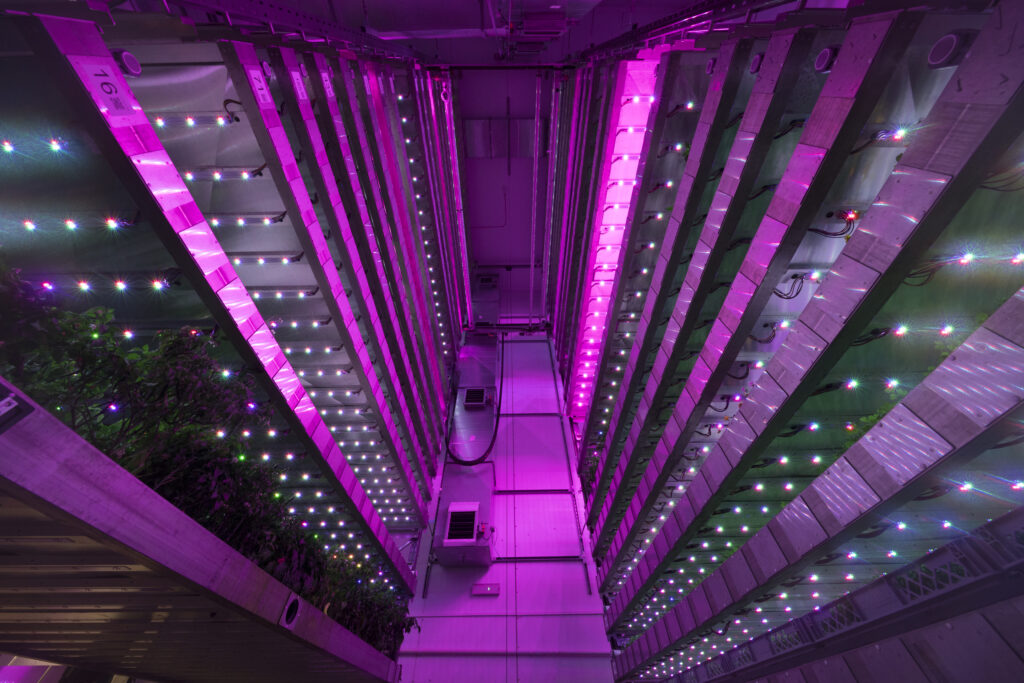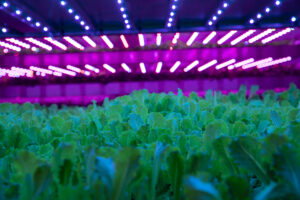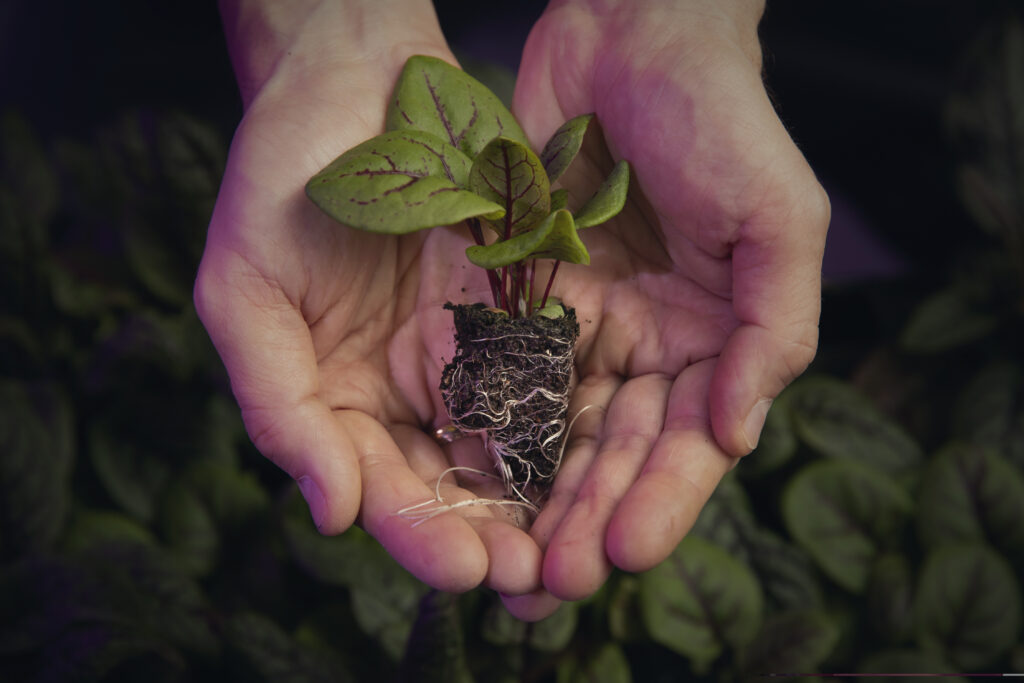
Scotland has an history of innovation, particularly in science and engineering, and this pedigree remains strong today. It may then seem an obvious place for a new industry to take root combining technological innovation and plant science with a more traditional industry of agriculture – also a mainstay of the Scottish economy – into the emergent agritech sector. Intelligent Growth Solutions or IGS is at the forefront of this expanding industry which is offering a sustainable and scalable addition to the agricultural ecosystem right across the world. The opportunity to talk to Sarah Willis, CFO of IGS, is one we are very happy to share as she talks about how sustainability is at the heart of the business model, helping to drive growth across the globe.

Sarah Willis, Chief Finance Officer at Intelligent Growth Solutions
Sarah, you are CFO at Intelligent Growth Solutions (IGS), an agritech business head-quartered in Edinburgh. Can you tell us a bit about IGS and its vision?
IGS is a provider of hardware and software technology to the agricultural industry and we operate in what is commonly termed the controlled environment agriculture (CEA) space. Our growth towers are a powerful, smart system built for any environment, anywhere in the world and provide an optimal environment for plants to thrive. Our technology collapses the energy and labour costs associated with growing indoors, and significantly increases the yields, quality and consistency of the plants. Imagine being able to grow crops without exposing them to extremes of weather such as drought or floods. Our towers enable growers to create a “perfect summer’s day” 365 days a year.
IGS is a technology company born of innovation, bringing together decades of farming and engineering experience and a range of design and problem-solving talents. Our products are internationally recognised as best in class and repeatedly award winning; and it’s our people who make IGS, addressing some of the world’s most pressing challenges around food security and climate change.
Your previous experience was in Energy and Professional services. When making the move to an agritech business, was it the sector, the organisation or the role which attracted you most?
There are three things which attracted me to IGS and – I summarise them as the three ‘p’s’!
Firstly, the product. The technology is cutting edge and fascinating on a technical level. I studied medicine when I left school, and whilst my career as subsequently veered away from the sciences, I have always retained an interest in science and technology. Visiting the farm and seeing the technology “in situ” was captivating.
Secondly, the purpose. It’s a privilege to get up for work every day knowing that you and the team around you are doing something that is truly disruptive and can support huge positive changes in the way we get and produce our food.
And finally, and most importantly for me, the people. My leadership team is highly experienced and talented – I knew I was coming into a team that was driven, capable and inclusive. David Farquhar our CEO leads with passion, integrity and humility and sets a great example. Equally, our investors are some of the world’s most active agritech investors, and provide great challenge, guidance and insight.
“The ambition is to build a robust, sustainable business which looks after its people whilst building a profitable, economic offering for its customers.”
How important is the agritech sector in Scotland and wider UK? How does that complement a wider sustainability agenda at local and national level?
Hugely. The Global Vertical Farming Market is set to reach $12.77BN by 2026 (Allied Market Research). 72% of food is exported/imported (CIAT) outside of the country in which it was grown, the food value chain experiences significant wastage and food losses (on average 30%) associated with crop risk and post harvesting processing, transportation, distribution and consumption. The UN anticipates that we will need more food in the next 30 years than in the previous 10,000 combined, yet land scarcity and climate change are impacting the ability to grow by traditional methods. In addition, agriculture has become the leading contributor to climate change alongside transport.
With this, awareness across the ecosystem has heightened, with experienced growers looking for alternatives to greenhouses and other complementary forms of Controlled Environment Agriculture (CEA), faster sales cycles and ability to grow at scale. Traditional broad acre farmers are seeking better starter plants, diversification, and existing indoor growers are looking for better starter plants, and extending the growing day to maximise returns. Similarly, governments globally are looking at ways to future proof and localise their food supply.
And these challenges are echoed at a national level for Scotland and the UK. IGS represents a unique opportunity for a Scottish technology firm to be at the forefront of supporting the UK to securitise its food strategies. This is particularly crucial in light of war in Ukraine and global food supply issues.
Is enough being done nationally to enhance skills and experience, as well as enable diversity in agritech and technology more broadly in Scotland?
There is always more we can do. Agritech and technology sectors more generally are some of the most gender imbalanced of any sector, particularly in senior leadership positions. One of the key areas I feel that we need to continue to focus on starts at school – we must encourage young girls to participate in subjects that have been male dominated. The women in STEM movement has made significant strides, but there is still work to do to remove the unconscious bias and the language that often deters girls from choosing STEM careers.
Similarly, creating provisions for a career break is important. Fewer than one in five mothers return to full time work in the first three years after maternity leave. Allowing for career breaks – and not just for women who choose to have children – and providing them with the necessary provisions to enable them to come back to work in the same or similar position is key. Norway does this incredibly well and Scotland should look to some of those successful practices.
Government policy changes and targets to improve gender equality are vitally important. But so too is an employer’s commitment to building a workforce that represents society. Only then will we have a balanced company culture.
“IGS is a technology company born of innovation, bringing together decades of farming and engineering experience and a range of design and problem-solving talents”

How are you working to create a more inclusive environment and attract talent at IGS?
I am fortunate that I work for a business that is not only forward thinking in its way of revolutionising farming, but in its approach to people. I have a senior leadership team around me that makes me feel empowered and that in turn inspires me. Although we are a young business, and there are some practices that we don’t have the resources or maturity to put in place, we have just launched our internal D,E&I network, which is employee lead. I’m very proud of this step in our journey. Each of the network pillars is supported and sponsored by a senior leader and they will have their own vision, agenda and budget to work with. The network will respond to feedback from our organisation through surveys and feedback sessions, to continue to identify, focus on continuous improvement.
IGS is also heavily involved in various STEM activities. From inviting school teachers and pupils to our crop research centre in Dundee, to involvement in Fuel Change initiatives to working with universities and colleges across Scotland. We were particularly proud to host a large number of schools across Scotland to our demo farm at COP 26 in November 2021 – a perfect opportunity to educate and inspire our next generation of talent.
Similarly, we are proud to support a number of intern and apprentice programmes, including Scottish Saltires. This is one of the largest intern intakes for any company in Scotland. It allows IGS to access the incredible talent of both university students and young apprentices, and also enables us to coach, mentor and support the incredible talent within Scotland.
At a commercial level is there strong momentum to create more sustainable products with a greater circular economic impact?
The momentum is strong and present and rapidly growing. Shareholders, corporate boards and employees are demanding ambitious and management endorsed strategies, and this requires long term planning particularly around financing strategies. We are increasingly seeing transactions in the world’s financial and capital markets focusing away from short term profits to long term investments in R&D, machinery, infrastructure, human capital and healthcare and this needs to continue. I would personally like to see more coming from governments around green incentives, tax cuts and particularly for the ag tech industry, allowing for the creation of a level playing field against existing traditional methods (such as red diesel).

How are you integrating an ESG approach across the business?
ESG underpins everything we do at IGS. The fundamental premise of our product supports a cleaner, more efficient way of growing. However, as with DE&I, there is always more to do. We have a dedicated ESG lead in the business, who works with the senior management team to identify the areas that we can focus on to reduce our carbon footprint and move forward with our journey to net zero. We are about to publish our Net Zero roadmap which outlines our approach and focus areas.
Looking to the global stage what are IGS’ ambitions for the next two to five years?
The ambition is to build a robust, sustainable business which looks after its people whilst building a profitable, economic offering for its customers.
The Series B fundraise which we closed in November 2021, represents an opportunity to accelerate the growth phase of the business, and allow faster adoption of our technology on a global footprint, enter into strategic partnerships, and increase the crop ranges and accelerate R&D in the data science and software capabilities.
This article is featured in Canvas – Scotland Edition 2022